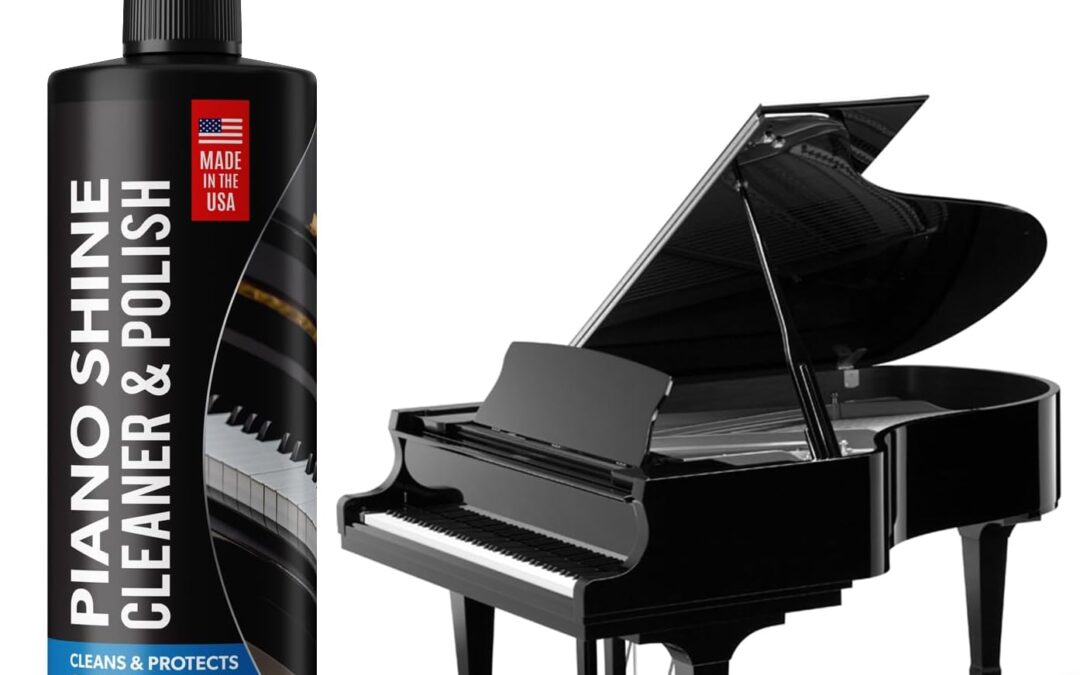How to Clean Piano Keys Ivory
There are two types of piano keys: plastic and ivory. Ivory keys were common before the ban on ivory trade, and they can still be found in some pianos owned by music enthusiasts. When it comes to cleaning piano keys, it’s important to consider the material they are made of. The cleaning process for plastic keys differs from that of ivory keys.
The white color of piano keys tends to attract dust and dirt, which can result in stains. To maintain the appearance of your piano keys, it’s recommended to clean them regularly. Here is a guide to help you clean your piano keys effectively, ensuring that your piano stays in pristine condition.


CLEANING PLASTIC PIANO KEYS
Before you begin cleaning your plastic piano keys, it’s important to prepare the right solution. Most plastic keys can be effectively cleaned using a mixture of soap and water. The soap helps in dissolving oil and dust particles that may have accumulated on the keys.
Start by pouring warm water into a bowl, and then add a few drops of mild detergent. Approximately two drops should be sufficient for cleaning your plastic piano keys. Alternatively, you can use bar soap by soaking a piece of cloth in warm water and rubbing it against the soap to absorb the solvent for cleaning the keys.
You can use a damp cloth to wipe the piano keys
When cleaning your piano keys, it is important to use a damp cloth rather than a wet one. Excess water can seep into the piano body and cause damage. So, make sure the cloth is only slightly damp to avoid any water leakage. Take extra care to prevent water from seeping into the body or other parts of the piano while cleaning the keys, as this can result in damage.
-
To clean your piano keys, simply use a clean white cloth
It is recommended to use a white piece of fabric when cleaning your piano keys. Using a colored cloth may transfer dye onto the keys, potentially causing further discoloration.
Make sure the cloth is clean before you start using it.
If necessary, wash the white cloth beforehand to prevent it from adding dirt to the piano keys during cleaning. This will help ensure that the keys are effectively cleaned without introducing any additional stains or marks.
CLEANING THE WHITE KEYS
When cleaning white piano keys, it is important to follow a specific method to ensure effective cleaning and prevent the spread of dirt and moisture. Begin by brushing the keys in a downward direction, avoiding sideways movements that may transfer dirt to adjacent keys. Similarly, avoid wiping the keys in a backward motion, as this can push dirt further into the keys. By brushing the keys downward, you can minimize the visibility of stains and effectively remove dirt and debris from the surface of the keys.
-
Use a different cloth specifically for cleaning the black piano keys
When cleaning the black keys, it is important to use a separate piece of cloth to avoid transferring dirt from the white keys. This is because the black paint on the keys can easily stain the white keys. Use the same front and back motion as you did when cleaning the white keys. Ensure that both pieces of cloth are clean to prevent the deposition of additional dirt on the piano keys during cleaning.
After cleaning, use a dry cloth to wipe off any soap residue. Use a back and front motion to remove the residue, ensuring that the dry cloth absorbs the soap residue effectively. Check carefully to ensure there are no residues left between the piano keys. If any residue remains, use the cloth you used to clean the white keys to remove it.
For residue on the white piano keys, use the same cloth you used to clean them initially. Follow the same procedure to clean any residue that may have been left on the black keys as well.
-
Remove fingerprints
To effectively clean your piano keys, wiping them down is a good start to remove dirt. However, fingerprints may still remain on the keys. To ensure a thorough cleaning process, you can follow a specific procedure to remove fingerprints from your piano keys. Here’s a simple step-by-step guide to effectively remove fingerprints:
-
Mix a solution of vinegar and water
To create a cleaning solution, mix 1 part vinegar with 4 parts water. Take a soft white cloth and dip it into the solution. Wring out the cloth so that it is slightly damp, ensuring it is not too wet. This will allow for comfortable and safe cleaning of your piano keys without risking damage to the piano body.
Wipe individual keys
Wipe and dry each piano key individually to ensure thorough cleaning. Take your time to wipe each key until it is clean before moving on to the next one. This will prevent any fingerprints from being missed. It is important to avoid leaving vinegar on the keys for too long, as it can potentially damage them by dissolving certain layers. By wiping and drying each key individually, you can maintain cleanliness and prevent dirt from accumulating between the keys.
-
Leave the keys uncovered for a day
After cleaning the piano keys, it is advisable not to immediately cover them with a piano key cover. This allows time for the vinegar smell to dissipate before covering. If you have a cover, you can also clean it separately and let it dry before using it to cover the keys. When leaving the keys uncovered overnight, it is important to choose a dust-free room. Otherwise, you may find dust settling on the keys the next day. Taking these precautions will help ensure a clean and well-maintained piano.
-
To prevent the accumulation of dust, cover the piano keys.
To save time on frequent cleaning, it is important to develop a habit of covering the piano keys after each playing session. By doing so, you can maintain the cleanliness of your piano and feel proud while playing on a clean instrument. Taking proactive measures like using key covers helps in keeping your piano in good condition and reduces the need for frequent cleaning.
How to Clean Piano Keys Ivory
The process of How to Clean Piano Keys Ivory differs slightly from cleaning plastic piano keys. Before proceeding with cleaning, it is important to determine if your piano keys are made of ivory, especially if the piano is an antique. Ivory keys were the first type of keys used in pianos but are now limited due to ivory trade restrictions. Consulting an expert can help determine if your How to Clean Piano Keys Ivory have any antique value. Conducting research and seeking professional advice is recommended befoHow to Clean Piano Keys Ivory.



WHEN CLEANING IVORY PIANO KEYS, IT IS IMPORTANT TO AVOID USING HARSH CHEMICALS AND SOAPS.
How to Clean Piano Keys Ivory requires different precautions compared to plastic keys. It’s important to note that ivory keys can absorb chemicals and moisture during the cleaning process. The absorption of chemicals can cause damage and discoloration to the keys. Avoid using bleaching agents or soaps on ivory keys as they can lead to wearing out of the keys, which undermines their protection and preservation.
-
Wear white cotton gloves
To prevent the transfer of oils and dirt onto the ivory keys, it’s important to avoid touching them with your bare hands. One way to achieve this is by wearing cotton gloves during the cleaning process. However, it’s crucial to use white cotton gloves and avoid colored ones that may transfer dye onto the white ivory keys. Wearing gloves from the beginning of the cleaning process will make it easier for you, as you won’t have to worry about cleaning fingerprints later. Cotton gloves are safe to use as they don’t react with the piano keys’ surfaces, allowing you to achieve optimal cleaning results.
-
Dust the keys
How to Clean Piano Keys Ivory, you can use a soft-bristled paintbrush or a duster. It’s important to work from the back to the front of the keys to prevent dust from getting trapped between them. As you clean, make sure to wipe away any dirt or dust that you observe. This will help prevent the accumulation of dirt in hard-to-reach areas, which can be challenging to clean due to the pushing action while wiping.
WIPE THE KEYS USING A DAMP CLOTH
How to Clean Piano Keys Ivory, you can soak a piece of cotton wool in water and use it to wipe the keys. It’s a simple process that ensures the keys are clean. While dusting removes most of the dirt, using a damp (not wet) cotton wool is effective in removing fine dust particles that may still be stuck on the ivory keys. It’s important to only use water to soak the cotton wool, as harsh chemicals can damage the keys. After cleaning the ivory keys, you may still not be satisfied with the color. In that case, there are specific methods you can use to whiten the keys.
WHITENING THE IVORY KEYS
To ensure that your piano keys are visibly clean, it’s important to achieve a white appearance. There are several methods you can use to whiten and maintain the attractiveness of your piano keys. One effective technique is to use a white vinyl eraser to rub the surface of each key. Rubbing the ivory with the eraser will help whiten the keys. Be sure to rub each key individually to achieve the desired cleanliness. After cleaning, you can remove any eraser residue by using the same dusting technique you applied earlier. It’s important to be gentle while cleaning to avoid creating uneven surfaces on the keys.
YOU CAN USE A FINE STEEL WOOL TO WHITEN THE IVORY PIANO KEYS.
To remove yellowing from your piano keys, you can use a fine steel wool. It’s important to use very fine pads to avoid scratching the keys while cleaning. Carefully rub the surfaces of the keys, ensuring even and gentle rubbing to prevent excessive abrasion and unevenness. Remember that cleaning the keys will be a recurring process throughout the lifetime of the piano, so take caution during each session.
How to Clean Piano Keys Ivory is to utilize sunlight. Simply leave the piano keys exposed to the sun on a sunny day, and they will naturally absorb the sunlight to brighten up. However, please note that this method won’t lighten the keys as effectively as physically removing yellowing. To prevent discoloration, it’s essential to take good care of your piano keys and use a cover to protect them from dirt and other factors that may cause discoloration.

